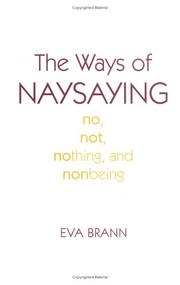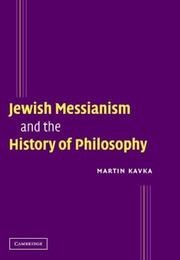| Listing 1 - 10 of 14 | << page >> |
Sort by
|
Book
ISBN: 9780792343882 Year: 1997 Publisher: Dordrecht [Netherlands] ; Boston : Kluwer,
Abstract | Keywords | Export | Availability | Bookmark
 Loading...
Loading...Choose an application
- Reference Manager
- EndNote
- RefWorks (Direct export to RefWorks)
Book
ISBN: 9788893630863 Year: 2017 Publisher: Bologna : Diogene multimedia,
Abstract | Keywords | Export | Availability | Bookmark
 Loading...
Loading...Choose an application
- Reference Manager
- EndNote
- RefWorks (Direct export to RefWorks)
Non essere e contraddizione: sono queste Le linee guide deLLo studio di Galgano, che si presenta come un'indagine dettagliata del "non essere" nel "Poema" di Parmenide. L'autore privilegia l'analisi puramente filosofica, senza con questo dimenticare il contesto filologico e storico dell'opera parmenidea. Con l'adozione di misure metodologiche ad hoc, la nozione di non essere viene isolata e resa autonoma rispetto alla problematica dell'essere. Ne deriva un Parmenide osservatore del comportamento della mente umana, un autentico psicologo - uno dei primi della storia del pensiero occidentale - capace di spingere la sua riflessione all'estremo, fino alla negazione della totalità delle cose. Parmenide perviene così ad elaborare un metodo di indagine secondo tre direttive, i tre precetti della Dea. atti a scoprire le caratteristiche dell'ente cosmologico, l'"eon".
Nonbeing. --- Ontology. --- Parmenides.

ISBN: 3826030176 Year: 2005 Publisher: Würzburg Königshausen und Neumann
Abstract | Keywords | Export | Availability | Bookmark
 Loading...
Loading...Choose an application
- Reference Manager
- EndNote
- RefWorks (Direct export to RefWorks)
Nonbeing --- Nothing (Philosophy) --- Plato.

ISBN: 0742512282 Year: 2001 Publisher: Lanham (Md.) : Rowman and Littlefield,
Abstract | Keywords | Export | Availability | Bookmark
 Loading...
Loading...Choose an application
- Reference Manager
- EndNote
- RefWorks (Direct export to RefWorks)
Book
Abstract | Keywords | Export | Availability | Bookmark
 Loading...
Loading...Choose an application
- Reference Manager
- EndNote
- RefWorks (Direct export to RefWorks)
Intellect --- Nonbeing --- Other (Philosophy) --- Philosophy, Ancient --- Plato. --- Plotinus.
Book
ISBN: 3631458150 Year: 1993 Publisher: Frankfurt am Main Lang
Abstract | Keywords | Export | Availability | Bookmark
 Loading...
Loading...Choose an application
- Reference Manager
- EndNote
- RefWorks (Direct export to RefWorks)
Nonbeing --- Religious aspects --- Christianity --- History of doctrines --- Tillich, Paul

ISBN: 0521831032 0511193882 9780511193880 9780521831031 051119594X 9780511195945 0511195281 9780511195280 9780521104630 0521104637 1280477865 9781280477867 0511314302 9780511314308 0511499094 9780511499098 0511194625 9780511194627 1107148383 0511193181 9781107148383 9780511193187 Year: 2004 Publisher: Cambridge Cambridge University press
Abstract | Keywords | Export | Availability | Bookmark
 Loading...
Loading...Choose an application
- Reference Manager
- EndNote
- RefWorks (Direct export to RefWorks)
Jewish Messianism and the History of Philosophy contests the ancient opposition between Athens and Jerusalem by retrieving the concept of meontology - the doctrine of nonbeing - from the Jewish philosophical and theological tradition. For Emmanuel Levinas, as well as for Franz Rosenzweig, Hermann Cohen and Moses Maimonides, the Greek concept of nonbeing (understood as both lack and possibility) clarifies the meaning of Jewish life. These thinkers of 'Jerusalem' use 'Athens' for Jewish ends, justifying Jewish anticipation of a future messianic era as well as portraying the subjects intellectual and ethical acts as central in accomplishing redemption. This book envisions Jewish thought as an expression of the intimate relationship between Athens and Jerusalem. It also offers new readings of important figures in contemporary Continental philosophy, critiquing previous arguments about the role of lived religion in the thought of Jacques Derrida, the role of Plato in the thought of Emmanuel Levinas and the centrality of ethics in the thought of Franz Rosenzweig.
Jewish philosophy --- Messiah --- Nonbeing --- Philosophy --- Non-being --- Nothing (Philosophy) --- Ontology --- Judaism --- History --- Religious aspects&delete& --- Doctrines --- Lévinas, Emmanuel. --- Lévinas, Emmanuel --- Nonbeing. --- Judaism. --- Religious aspects --- History. --- Lévinas, Emmanuel --- Views on nonbeing. --- Lévinas, Emmanuel. --- Arts and Humanities --- Religion --- Levinas, Emmanuel
Book
ISBN: 388345639X Year: 1995 Volume: 6 Publisher: Sankt Augustin : Academia Verlag,
Abstract | Keywords | Export | Availability | Bookmark
Book
Year: 1609 Publisher: [Cambridge : s.n.,
Abstract | Keywords | Export | Availability | Bookmark
 Loading...
Loading...Choose an application
- Reference Manager
- EndNote
- RefWorks (Direct export to RefWorks)
eebo-0014
Book
ISSN: 03448142 ISBN: 9783110345797 311034579X 3110345854 3110345846 3110377543 3110554534 Year: 2014 Volume: 118 Publisher: Berlin ; New York Walter de Gruyter
Abstract | Keywords | Export | Availability | Bookmark
 Loading...
Loading...Choose an application
- Reference Manager
- EndNote
- RefWorks (Direct export to RefWorks)
Seit Parmenides gehört die Frage, wie man auf etwas intentional "gerichtet" sein kann, das nicht existiert, zu den Rätseln der Philosophie. Gemäß einer Lesart besteht das Rätsel darin, ob Intentionalität eine Relation ist. Ist dem aber so und gehört es zur Natur einer Relation, nur zwischen Existierendem bestehen zu können, wie kann es dann eine "intentionale Relation" zwischen einer Entität und einer Non-Entität geben? Muss man, wie etwa Meinong, einen eigenen Status für jedes intentionale Objekt einführen? Oder sollte man eher die Idee aufgeben, Intentionalität sei eine Relation? In diesem Buch wird das Problem der Nicht-Existenz im Kontext dieser Fragen verortet und zum Ausgangspunkt einer Untersuchung von Husserls Phänomenologie bewusster Intentionalität gemacht. So werden z. B. Husserls Deutung von Urteilen über Nicht-Seiendes als Urteile "unter Assumption" und seine Analyse der freien Phantasie untersucht. Husserl wird insgesamt als Nicht-Relationalist gedeutet, der sich als systematisch anschlussfähig an zeitgenössische nicht-relationale Theorien erweist.
Phenomenology --- Nonbeing --- Nothing (Philosophy) --- Husserl, Edmund, --- Intentionality (Philosophy) --- Nonbeing. --- Phenomenology. --- Intentionality (Philosophy). --- Nothing (Philosophy). --- Nothingness (Philosophy) --- Nihilism (Philosophy) --- Ontology --- Non-being --- Philosophy, Modern --- Husserl, Edmund --- Husserl, Edmond --- Husserl, Edmund, - 1859-1938 --- Enigma, judgement, imagination, 20th century.
| Listing 1 - 10 of 14 | << page >> |
Sort by
|

 Search
Search Feedback
Feedback About UniCat
About UniCat  Help
Help News
News